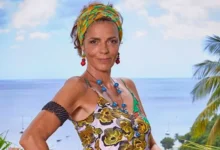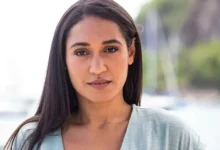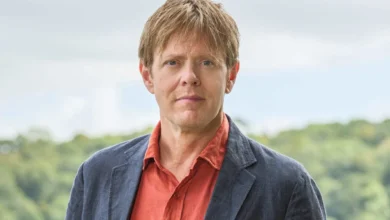Dᴇᴀᴛʜ in Paradise’s Don Gilet: ‘I don’t want to be put up for a character that’s there because of his colour’
The latest star of BBC One’s hit whodunit talks about resisting Hollywood, his school reports, and how he became a bodypopper par excellence

Don Gilet insists he hates interviews – repeatedly comparing our encounter to an aggressive police grilling.
If that is true, he is a brilliant actor, off-screen as well as on. We begin with the 58-year-old giggling as he mock-reprimands me for ordering a black tea. “You can’t say black! Man, what a way to start! You need to say ‘tea without milk’.” At the same time, he asks for a glass of water because: “My mouth gets very dry when I’m being interrogated.”
It is all delivered with the wit and warmth that have become trademarks of the BBC’s mega-hit, Dᴇᴀᴛʜ in Paradise, whose 14th series begins on Friday. Gilet first appeared as DI Mervin Wilson, the fifth fish-out-of-water UK policeman called to the Caribbean, during the Christmas special, after the departure of Ralf Little’s Neville Parker.
The abrasive, bucket hat-wearing cop is in fictional Saint Marie on personal business, trying to locate the mother he has never met. The series, which launched in 2011, was the UK’s most-watched returning drama last year, across all broadcasters and streamers, and is aired in 230 territories.

Gilet says he never reads his own press, and was equally unaware of the snobbery with which critics have treated the show over the years (“Miss Marple with coconuts”; “That nursing home favourite”) as he was of the glowing reviews he received for his December debut.
But he laughs when I mention the articles that seemed to regard this as his first lead role, ignoring the fact that he led the cast of another fish-out-of-water BBC drama – 55 Degrees North – way back in 2004. “You see what I mean. That’s why I don’t read this stuff,” he says, before changing tack. “Well, that’s a mark on how memorable I was, I suppose.”
Was he not frustrated that despite appearing in several prime-time dramas such as Doctor Who and EastEnders – he has had to wait two decades for another star part to come along.
“That way madness lies,” he says. Instead, his ambition is “to be a good storyteller, because I like that word more than just actor – I’m a storyteller.”

On set, Gilet has three priorities: surviving the constant heat, avoiding the mosquitoes and memorising the lengthy scripts for the pivotal final scenes, where the DI meticulously and theatrically unravels the case.
What are the tricks for dealing with the first on his list – does he have assistants hosing him down as soon as the director shouts “Cut!”? “Haha, this isn’t Hollywood,” he says, “this is Guadeloupe.” Instead, he relies on a rail of identical shirts and, in between scenes, he rushes towards an industrial-size fan. “It’s that kind of Marilyn Monroe moment, or Michael Jackson, you know when he does that waaaaaay,” referencing the King of Pop crying out while being blasted by a typhoon in the video for 1995’s Earth Song.
Gilet has barely had a chance to chat to the locals, and has banned his loved ones from visiting, because he is too busy holed up in his caravan preparing. (Gilet has a teenage son and earlier this month Happy Valley star Siobhan Finneran described him in an interview as “my fella”).
Regarding those denouements, in the Christmas special, DI Mervin asked if he had to do the stagy setpiece, in which he solved the murder in front of the line-up of suspects, pleading: “Can’t I just write it up in the case file?” But he was told by Don Warrington’s Commissioner Patterson: “Let’s say, it’s a matter of tradition.”
That end sequence, where the up-till-now white boss delivers all the answers to his all-black underlings, is a signature of the series, but led to criticism that the show encompassed, as one TV writer put it: “The bothersome, colonially tinged idea of the white blow-in solving crimes that are beyond the local police.”

When I interviewed Kris Marshall – the series’ second DI – last February, I asked him who should replace Ralf Little. Perhaps in response to the “white saviour” discourse, he told me: “What I think would be really brilliant for the show now is that they have a person – whether guy or girl – of Caribbean heritage who’s grown up in Britain, is completely, for want of a better word, anglicised, has never been to the Caribbean and finds it really hard. Because obviously we’ve had lots of middle-aged white guys, and the show’s been a success, but I think it would really give it another angle.”
Gilet is diplomatic in response to Marshall’s quotes: “Well, I mean, nice one, for him to say that.” The problem is he has spent his career trying not to be a token and avoiding, as he puts it, “getting political”.
So would he prefer “interrogators” like me to skip the question entirely, or is his appointment as the first non-white lead a milestone that should be marked?
“From an audience point of view, I would hope they could put that to one side. I’ve always said to my agent – I don’t want to be put up for a character that’s there because of his colour.”

He concedes that diversity on TV has been transformed during the course of his career. “But it’s not a thing I want to reflect on because I always like to think, if I get that job, it’s because I was right for the job and if I didn’t get it, I wasn’t. Not to get bitter about, ‘Is it because I is black?’” he says, channelling Ali G, “because then you become defined by that and I don’t want to be.”
Unlike Babyfather co-star David Harewood – who crossed the Atlantic to star in Homeland – Gilet never made a sustained stab at making it in the US. “There’s a part of me that’s almost a naive determination to go, wouldn’t it be great if you could establish your foothold here where you were born instead of going somewhere else?”
Another thing he does not want to do is breakdance, which is still listed on his CV. He included it way back in his teens and tells me now that he was always “more of a body-popper, really, than a breakdancer. I had a very good physicality for robotics, so I knew my talent and I just wish I kept it to myself. I think I’d look like David Brent.”
He remembers a love of performing “from the nativity”, but felt he “had to just shelve” it during his adolescence when an interest in drama was not conducive with being “one of the lads”. One school report said “if I put the same amount of energy into the lesson as I do into making people laugh, I’d be an asset to society.”
His housewife mother and his “proper go-out-to-work, grafting dad”, who worked in public transport in Walsall, were anxious about his decision not to pursue a trade. “Parents who work hard to bring food on the table and you thinking I just want to be an actor, it’s like, get real.”

Gilet got real for a short time, toiling at all manner of jobs in factories that no longer exist. “I worked in a brass foundry making horse bridles – all that machinery, lathes, wearing those industrial gloves and working in heat, grease and listening to Radio 1.”
All the while, he says, he was “just thinking OK, this is good, but I do not want this to be my life. I have ideas away from this station, not above it.”
As we conclude our chat, Gilet – a storyteller, not an actor; a body-popper, not a breakdancer – corrects me one final time. I ask if the fact that today he is donning a gilet is intended as any kind of in-joke. Absolutely not, he asserts: his surname is Gill-AY. The garment is pronounced GEE-lay.
Anyway, he adds with a smile: “This is a bodywarmer.”
Dᴇᴀᴛʜ in Paradise begins on Friday January 31 at 9pm on BBC One.




